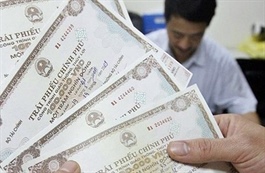Bond issuances surge despite lack of credit ratings
Bond issuances surge despite lack of credit ratings
A report by the Vietnam Bond Market Association shows that in the first four months of this year, the total value of corporate bond issuances amounted to $1.5 billion and included six initial public offerings and 30 private placements.

During the same period, the volume of bonds enacted by real estate firms accounted for over 51 per cent, much higher than last year’s figure of 22.5 per cent, while construction businesses have also massively embraced bond issuances.
In the first quarter (Q1) of the year, bond values distributed by businesses in the construction and building material sectors grew by more than 2.5-fold compared to the whole of 2023.
Bond transactions in the market were also vibrant. Nguyen Quang Thuan, CEO of FiinRatings, a provider of financial data analytics and research, said, "The average value of bond transactions was approximately $166.6 million in Q1, soaring over 2,100 per cent on-year, with the real estate sector making up 29 per cent of the market’s total transaction value."
Economist Le Xuan Nghia believes it is necessary to turn corporate bonds into a key capital mobilisation source for the economy; and in the long term, corporate bonds must be made the main medium and long-term capital raising channel for businesses.
"Consumer loans account for 50-70 per cent of total outstanding loans in the United States and Europe, meaning banks mainly lend short-term. With long-term capital, businesses mainly mobilise through the bond and stock markets," said Nghia.
"Vietnam has a lot of work to do to build a healthy corporate bond market, especially with corporate bonds issued to the public and increasing credit ratings. If the market was designed properly, Vietnam would be a leading corporate bond market in the region," he added.
Economic experts believe that a developed credit-rating culture would contribute to increased transparency and improved investor confidence, thereby creating the conditions for developing a healthy and sustainable corporate bond market.
The government's goal is to increase the scale of the corporate bond market to 20 per cent of GDP by 2025, increasing to 30 per cent by 2030, from the current level of 10 per cent.
However, the rate of corporate bonds with credit ratings in Vietnam is still low. According to FiinRatings, the proportion of rated corporate bonds in ASEAN countries averages 51 per cent; with the highest amounts in Indonesia, Thailand, and Malaysia, ranging from 54-82 per cent.
Meanwhile, in Vietnam, last year saw rated corporate bonds accounting for just 9 per cent of total privately issued corporate bond volume.
In Q1, there were 30 individual corporate bond issuances worth more than $1.12 billion, but the amount of rated corporate bonds only accounted for 7.5 per cent.
"Investors need to understand the role of credit ratings to make decisions and manage risk for their portfolios," said FiinRatings CEO Thuan.























